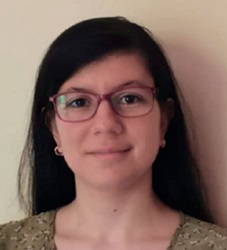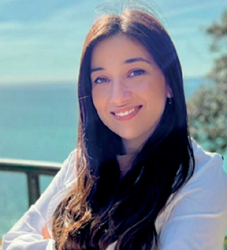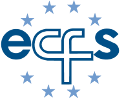Gerd Döring Award 2023
The Gerd Döring Award is an initiative of the European Cystic Fibrosis Society and is given annually to honour an exceptional young European scientist in their early career. The Award includes a monetary donation of 5,000 euro to support research. This year, the Award is given to Lúcia Santos (PT) in acknowledgement of her work.
Lúcia Santos
Biography
Lúcia Santos is a Biomedical Scientist who obtained her Ph.D. in Biology from the University of Lisbon. In the past six years, in collaboration with the University College Cork, her studies have been focused on the use of gene editing tools in order:
i) to understand the effects of different CF-causing mutations on the transcriptome and proteome of human bronchial epithelial cells;
ii) to develop novel strategies to reverse the disease.
In her paper, Mutation‑class dependent signatures outweigh disease‑associated processes in cystic fibrosis cells (doi: 10.1186/s13578-023-00975-y), she combined transcriptome and proteome analysis to understand the global gene expression patterns associated with five prototypical CFTR mutations. The evaluation of the differentially expressed genes and proteins unveiled common and mutation-specific changes revealing functional signatures that are much more associated with the specific molecular defects associated with each mutation than the CFTR loss-of-function phenotype. The combination of both datasets revealed that mutation-specific detected translated-transcripts (Dtt) have a high level of consistency. This study provides novel insight into the pathophysiology of CF and the mechanisms through which each mutation class causes disease and will likely contribute to the identification of new therapeutic targets and/or biomarkers for CF.
Lúcia will be presenting her research in Vienna at the Late Breaking Science session, scheduled on Friday, 9 June, 17:00-18:30.
Young Investigator Award 2023
Following the recommendations of the Steering Committee during the abstracts review process, the ECFS wishes to commend the quality of the work presented in the abstracts of some young investigators under the age of 35 having applied for the award.
The Young Investigator Award includes a monetary grant of € 750, a free registration to the Conference, and a 2023 ECFS membership subscription. We wish to extend our congratulations to the following Young Investigators:

Samantha Durfey
Biography
Samantha grew up in Tupper Lake, NY, a small town in upstate New York near a tuberculosis research centre. This early exposure to microbial research inspired Samantha to pursue her undergraduate degree in microbiology at the University of Alabama, Tuscaloosa. She then moved to the University of Washington, Seattle, to pursue a PhD under the guidance of Pradeep Singh. Samantha plans to pursue a postdoc studying immune responses to chronic infections.
About the research presented at the 46th European CF Conference, abstract number WS13.06:
Regional bronchoscopy sampling indicates that Pseudomonas aeruginosa infections persist throughout the lung after elexacaftor/tezacaftor/ivacaftor (ETI) due to intra-lung bacterial migration.
Recent work suggests Pseudomonas aeruginosa (Pa) infections usually persist after elexacaftor/tezacaftor/ivacaftor (ETI), but mechanisms of post-ETI infection are unknown. A leading hypothesis posits that lung segments with mild structural damage will clear infection, while those with severe damage will remain infected. To test this, we performed bronchoscopy in 9 adults, before and 1.5 years after they initiated ETI. We sampled the 2 highest and 3 lowest damaged lung segments in each subject. Six subjects remained infected after ETI. In these subjects, nearly all high and low-damage segments remained Pa-positive. Segments could remain infected because the local Pa present before ETI persist, or because Pa from other segments migrate to colonise these regions. We used whole genome sequencing of Pa isolates collected from each lung segment before and after treatment to distinguish these possibilities. Samantha will present these results and discuss the implications for future CF research.

Floriana Guida
Biography
Floriana was born in Sorrento (Naples, Italy) in 1995. She received a master’s degree in molecular biology from University Federico II (Naples) in 2019. She performed her master’s degree thesis and a postgraduate fellowship at TIGEM (Institute of Genetics and Medicine of Pozzuoli, Naples), then moved on to the University of Genoa, where she currently attends the second year of PhD in genetics, studying alternative targets for the treatment of cystic fibrosis basic defects.
About the research presented at the 46th European CF Conference, abstract number WS04.05:
Alternative targets for the treatment of Cystic Fibrosis basic defect
Our research focuses on identifying novel therapeutic approaches for cystic fibrosis (CF). Correction of CF lung abnormalities may be obtained by restoring the function of CFTR with mutation-specific treatments. A potential alternative approach is to modulate the activity of other targets to stimulate CFTR-independent anion secretion or inhibit acidification. Despite the increasing interest towards possible alternative targets such as TMEM16A, SLC26A9, SLC26A4 and ATP12A, their precise function and expression in the airways are largely unknown or controversial, and specific modulators are still lacking. I will present the results of our research on expression and role of these targets in CF and non-CF airways, and our advances in finding drug candidates for the best targets. This could be essential for CF patients expressing undruggable CFTR mutants but could also be useful as an adjuvant therapy supporting the effect of CFTR rescue manoeuvres.

Christie Mitri
Biography
Christie Mitri is a Ph.D. graduate in Physiology, Physiopathology, and Therapeutics from Sorbonne University in Paris, France. Originally from Lebanon, she moved to France in 2017 to pursue her master's degree in Integrative Biology and Physiology. During her studies, Christie received a scholarship from Blanche and Vaincre la Mucoviscidose associations to work on developing innovative treatments for cystic fibrosis patients using antisense oligonucleotides under the supervision of Dr. Olivier Tabary. Christie is currently a postdoctoral researcher funded by the Foundation for Rare Diseases and is continuing her research to bring new treatments to cystic fibrosis patients.
About the research presented at the 46th European CF Conference, abstract number WS17.03:
An alternative mutation agnostic therapy for Cystic Fibrosis with oligonucleotide antisense
CFTR correctors and potentiators have shown promising clinical outcomes, but alternative CFTR-independent strategies are still necessary for some patients. Our research focuses on activating an alternative chloride channel TMEM16a to compensate for the CFTR lack of activity. Previous studies demonstrated that miRNA-9 downregulates TMEM16A expression by binding to its 3'UTR mRNA. We developed an antisense oligonucleotide (TMEM16A ASO) that binds to the TMEM16A 3′UTR and prevents microRNA-9 from binding to the TMEM16A mRNA, therefore restoring TMEM16A expression and activity in the bronchial epithelia. I will present the results of in vitro and In vivo experiments studying TMEM16A ASO effectiveness, specificity and toxicity. TMEM16A ASO could be combined with CFTR modulators or TMEM16a potentiators to target multiple fronts, and this strategy could be applied to all people with CF.

